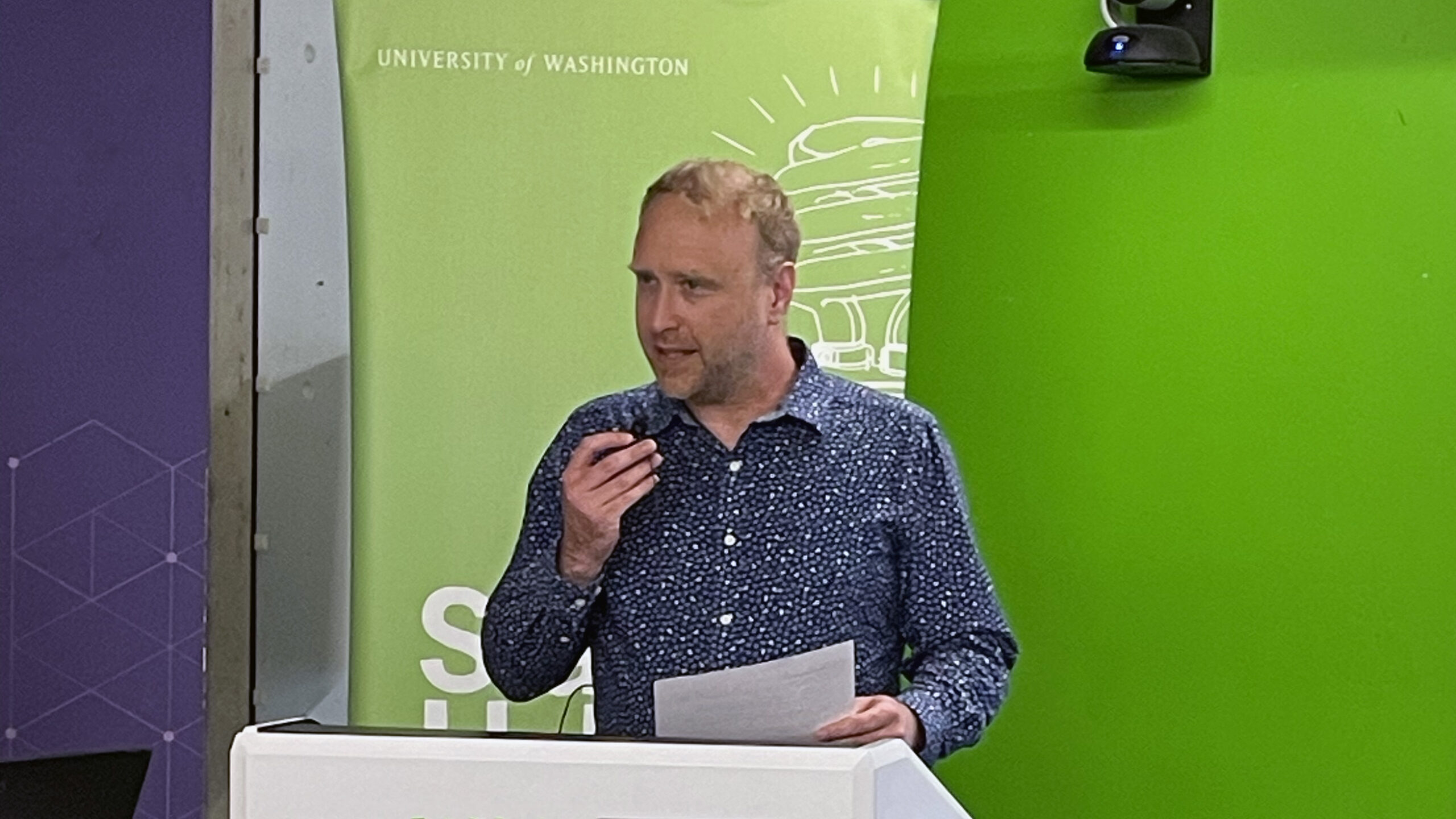11 teams receive $575K for commercialization and business development efforts

Ryan Buckmaster, CoMotion director of innovation investments, welcomes IGF teams to the in-person final pitches at Startup Hall.
On June 20, CoMotion announced the awardees of the spring 2025 cycle of the CoMotion Innovation Gap Fund (IGF), CoMotion’s signature funding program for researchers working on projects with commercial potential.
Of the 15 teams that competed for a pool of $575K, 11 took home awards of $10K-$75K to support proof-of-concept and go-to-market strategy activities and move projects forward to the next stage of commercial development and investment.
The IGF process pairs promising research teams in life sciences, engineering, IT/software, and social impact with industry mentors who help them refine their pitch through a series of deliverables and practice sessions. Final presentations are reviewed by members of the local innovation ecosystem, including CoMotion and Washington Research Foundation staff and local entrepreneurs and investors, then ranked by market opportunity and the likelihood that awarded funds will contribute to commercial success. Many teams go on to receive SBIR/STTR awards and external investment.
“It is always so impressive see the progress that teams make as they explore the commercial potential for their innovations,” says Ryan Buckmaster, director of innovation investments at CoMotion, who oversees IGF. “At the end of the process we ask them to make an investment-style pitch and they nail it, despite having never done one before. These are skills participants will take with them as they pursue future funding.”
IGF has made 387 awards totaling $18.1M since 2005. IGF-funded innovators consistently outperform their peers in achieving licensing and startup milestones; 110 IGF-supported spinoffs have raised more than $6B and created more than 2,100 jobs.
Funding for the IGF is provided by CoMotion, the Washington Research Foundation, and UW’s Population Health Initiative.
Teams receiving full $75K awards
LUSS (Lung Ultrasound Sensor)
To help heart failure patients get the right care at the right time, this team is developing a small, automated lung sensor that checks for fluid buildup—without the need for expensive machines or expert operators.
Applied Environmental Intelligence
This team is improving railway safety with TrackMate, an AI-powered system that uses existing fiber networks to detect problems in real time, helping prevent accidents, theft, and service disruptions across long stretches of track.
3D Forward Looking Sonar (FLS)
To make underwater navigation safer and more efficient, this team has developed a compact 3D sonar system that gives operators a clear, wide-angle view, reducing the risk of damage or loss to unmanned vehicles.
Agelas Bio
To tackle deadly and hard-to-treat cancers like liver cancer, this team has developed a next-generation immunotherapy that triggers a strong immune response at much lower doses, offering new hope where earlier treatments fell short.
Immunoassay at Home for Monitoring of Inflammation
This team is using low-cost paper tests and AI to help people track and manage inflammation—a key driver of chronic disease—before it leads to serious health problems.
Teams receiving $50K awards
BioSyft Technologies
This team’s AI-powered platform gives researchers deeper insights into animal behavior with less effort—improving accuracy, reducing variability, and accelerating progress in disease research and drug development.
High-power Micro-battery
To extend battery life in demanding, compact applications like medical implants, this team has developed a new activation process that doubles power output while preserving nearly all of the battery’s capacity.
CureXsco
To cut costs and reduce pollution, this team has created a system that uses supercritical CO₂ to clean and reuse industrial water filters—safely destroying toxic PFAS chemicals in the process.
Teams receiving $10-25K awards for project and business development activities
Gradient Power
This team has developed a low-cost material that sits under solar panels, turning excess heat into extra power—boosting energy output by up to 30% while helping panels last longer.
GLOCASSA
To improve cancer care in low-resource settings, this team has created a mobile platform that guides patients with timely, accurate information to boost treatment adherence and outcomes.
CROSS Suction
This team has developed a surgical tool that combines suction and tissue gripping to help surgeons control bleeding faster—improving visibility and reducing operation time for better patient outcomes.
Applications for the fall 2025 IGF cycle will open later this summer.